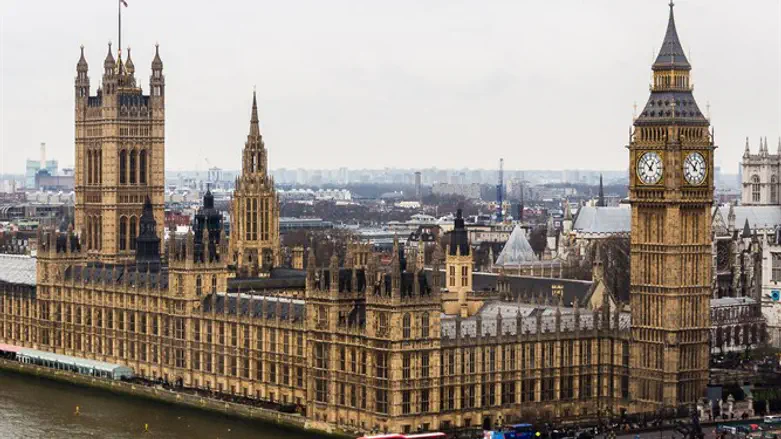
Twenty one percent of the British adult population – or about eleven million people -- tend to agree "strongly" or “to some extent” with the idea that Israel is an apartheid state. Ten percent – or five million -- tend to agree that people "should boycott Israeli goods and products". In view of the number of people approving these biased statements against Israel it is not reassuring that only 23% disagree with the contention that Israel is an apartheid state while 46% disagree with the boycott of Israeli goods.
This data about some aspects of antisemitism targeting Israel results from a new study titled “The Apartheid Contention and Calls for a Boycott” by David Graham and Jonathan Boyd published in January 2019, jointly by the Institute for Jewish Policy Research (JPR) and the Community Security Trust (CST).
Those interviewed were given twelve statements where they were asked to respond if they agreed or disagreed “strongly” or “to some extent” with them. "Israel is committing mass murder in Palestine" received the largest percentage of agreement of 24%. Twenty-three percent agreed with the statement "Israel is deliberately trying to wipe out the Palestinian population." In other words, 13 million UK citizens have a demonic view of Israel.
Eighteen percent of respondents agreed with the statement that the "interests of Israel are at odds with the interests of the rest of the world." If the word “Israel” is replaced with the word “Jew,” it is clear that a classic antisemitic image has mutated into an anti-Israel sentiment. The same has happened with “Israel has too much control over global affairs," a statement that 17% of adult Brits agree with. Yet another such statement, “Israel is the cause of the all the troubles in the Middle East” received 10% agreement. All these statements could have come out of an updated version of Hitler's Mein Kampf, one that deals with Israel rather than with Jews.
Thirteen percent of respondents agreed with the statement "Israel exploits Holocaust victimhood for its own purposes." Five percent disagreed with the statement, "Israel has every right to exist." This is tantamount to approximately 3 million people. For many statements those who neither agree or disagree or don't know, make 
Five percent disagreed with the statement, "Israel has every right to exist." This is tantamount to approximately 3 million people. up close to or more than half the people polled.
up close to or more than half the people polled.
Many other important insights result from the study. The highest percentage of those who agree that "Israel is an apartheid state" are those over 60 years in age while the lowest are those under 30 years old. This is true as well for those who disagree. People with university degrees tend to agree more with the statement "Israel is an apartheid state” than others." As for this last statistic, one might well wonder about the influence of the left on university campuses today.
The presence of antisemitism in the Labor party is widely known. Yet, the largest number of anti-Israel positions are found among those who vote for smaller parties. Thirty-seven percent of those who intend to vote for Scottish or Welsh nationalists agree with the statement that "Israel is an apartheid state." Thirty-one percent of Green Party voters agree. For Liberal Democrats, the percentage is 30% and even for the rather right-wing UK Independence Party, the figure is 26%. All these percentages are above average.
Of those who vote for the Conservative Party, 18% agree that "Israel is an apartheid state." Among those intending to vote for Labor the figure is 27%. As far as agreeing with boycotting Israeli goods and products, Labor voters lead the field with 16% followed by those of the Green Party with 14%. Conservatives come in at 6%. All others are close to the average of 10%.
If one looks at the percentages of those who agree with the "apartheid statement" broken down by ethnic communities, we find 52% approving among British Arabs, 33% among Asian Pakistani and 30% among Asian Bangladeshi. All of these groups are Muslim. These are followed by Asian Indians with 28%. Among white British citizens the figure is 24%. The lowest percentage of agreement, 17%, is among the black population.
As far as "boycotting Israeli goods and products," Arabs and other Muslims lead the field in agreeing with this. The percentages are 45% Arab, 43% Asian Pakistanis and 37% Asian Bangladeshis. Even Asian Indians, among which Muslims are probably a minority, are at 25%, far above the 10% average.
The study also differentiated answers by respondents’ religion. The findings confirm that Muslims are the most anti-Israel of those polled. Thirty-four percent of Muslims agree with "boycotting Israeli goods and products." The figures for the non-religious are 14% and 8% for Christians. As far as the apartheid contention is concerned, the difference in statistics among adherents of religion are less dominant. The study also concludes that the greater the level of anti-Jewish feeling, the greater the likelihood of agreement with the two contentions about Israel.
The findings of this study are not only an indictment of many millions of Brits and a far greater percentage of Muslim immigrants and their descendants, but these findings must also lead to a strong condemnation of the Israeli government which has yet to establish an anti-propaganda agency. Israeli embassies are not equipped to deal with these problems. After the forthcoming elections, Knesset members should raise the anti-propaganda issue forcefully.